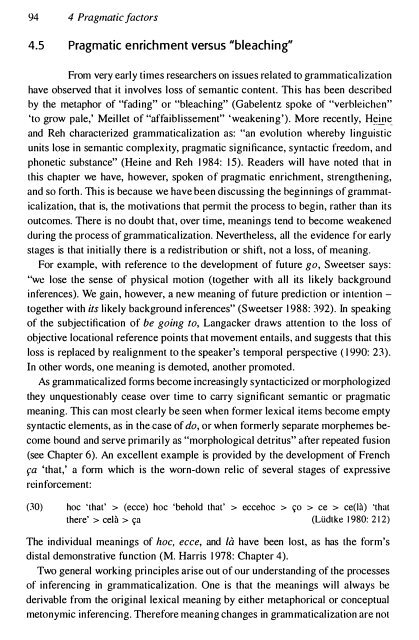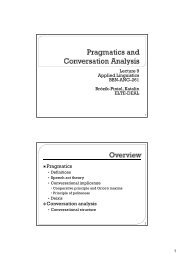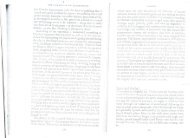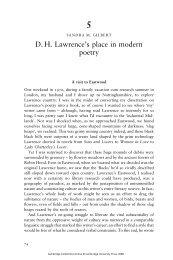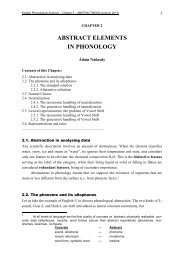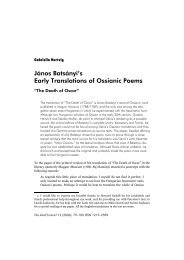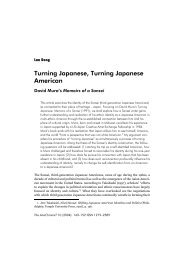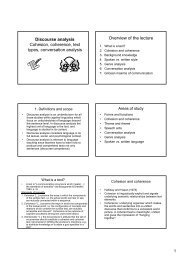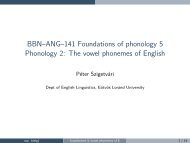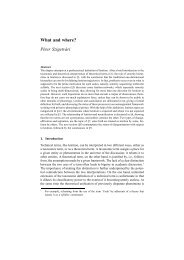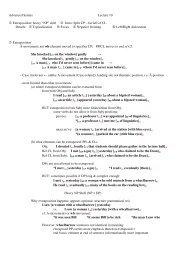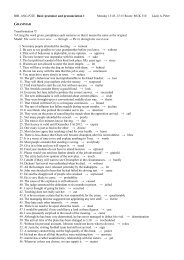Gram - SEAS
Gram - SEAS
Gram - SEAS
You also want an ePaper? Increase the reach of your titles
YUMPU automatically turns print PDFs into web optimized ePapers that Google loves.
94 4 Pragmatic factors<br />
4.5 Pragmatic enrichment versus "bleach ing"<br />
From very early times researchers on issues related to grammaticalization<br />
have observed that it involves loss of semantic content. Th is has been described<br />
by the metaphor of "fading" or "bleaching" (Gabelentz spoke of "verbleichen"<br />
'to grow pale,' Meillet of "affaiblissement" 'weakening'). More recently, Hl!l e_<br />
and Reh characterized grammaticalization as: "an evolution whereby linguistic<br />
units lose in semantic complex ity, pragmatic significance, syntactic freedom, and<br />
phonetic substance" (Heine and Reh 1984: 15). Readers will have noted that in<br />
this chapter we have, however, spoken of pragmatic enrichment, strengthening,<br />
and so forth. Th is is because we have been discussing the beginnings of grammaticalization,<br />
that is, the motivations that permit the process to begin, rather than its<br />
outcomes. There is no doubt that, over time, meanings tend to become weakened<br />
during the process of grammaticalization. Nevertheless, all the evidence for early<br />
stages is that initially there is a redistribution or shift, not a loss, of meaning.<br />
For example, with reference to the development of future go, Sweetser says:<br />
"we lose the sense of physical motion (together with all its likely background<br />
inferences). We gain, however, a new meaning of future prediction or intention -<br />
together with its likely background inferences" (Sweetser 1988: 392). In speaking<br />
of the subjectification of be going to, Langacker draws attention to the loss of<br />
objective locational reference points that movement entails, and suggests that this<br />
loss is replaced by realignment to the speaker's temporal perspective (1990: 23).<br />
In other words, one meaning is demoted, another promoted.<br />
As grammaticalized forms become increasingly syntacticized or morphologized<br />
they unquestionably cease over time to carry significant semantic or pragmatic<br />
meaning. This can most clearly be seen when former lexical items become empty<br />
syntactic clements, as in the·case of do, or when formerly separate morphemes become<br />
bound and serve primarily as "morphological detritus" after repeated fusion<br />
(sec Chapter 6). An excellent example is provided by the development of French<br />
ra 'that,' a form which is the worn-down relic of several stages of expressive<br />
reinforcement:<br />
(30) hoc 'that' > (ecce) hoc 'behold that' > eccehoc > ,,0 > ce > ce(lli) 'thut<br />
there' > celli > .. a (LUdtke 1980: 212)<br />
The individual meanings of hoc, ecce, and La have been lost, as has the form's<br />
distal demonstrative fu nction (M. Harris 1978: Chapter 4).<br />
Two general working principles arise out of our understanding of the processes<br />
of inferencing in grammaticalization. One is that the meanings will always be<br />
derivable from the original lexical meaning by either metaphorical or conceptual<br />
metonymic inferencing. Therefore meaning changes in grammaticalization are not


